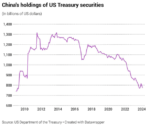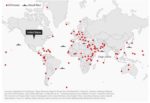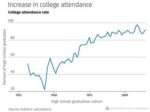During his 2024 presidential campaign Donald Trump repeatedly and in grave terms highlighted the possibility of the US dollar losing its world reserve currency status. This occurred at summits with business leaders at the New York and Chicago Economic Clubs.Trump occupies a rather unique position in this debate since he recognizes the real possibility of the dollar losing its world currency status, he opposes this change and wishes to prevent it, and yet he is not a paradigmatic member of the ruling class. However mainstream he is—today or in the past—he doesn’t possess the establishment credentials of a Ben Bernanke, for instance.Since Trump doesn’t want the dollar to lose reserve currency status, his acknowledgment that this is a real possibility should at least serve as ammunition
Read More »2024-12-11



























